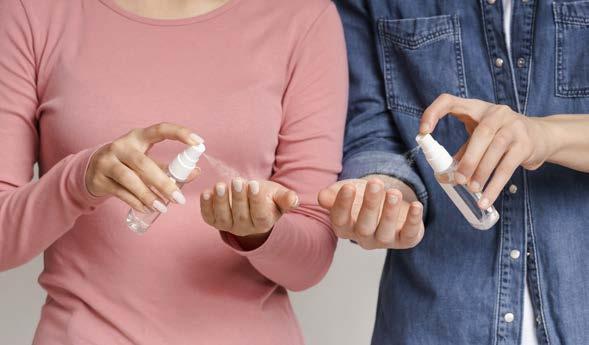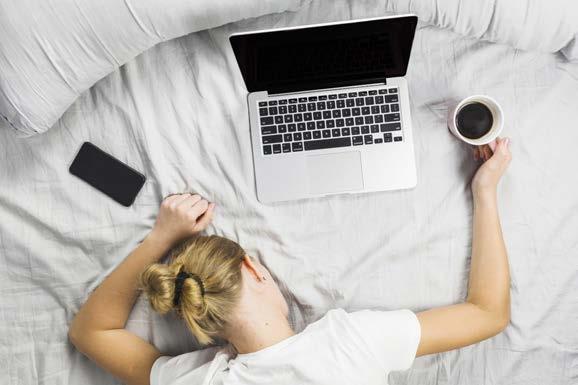
6 minute read
Dealing with a Crisis
Admit it… prior to 2020 when you thought pandemic your mind conjured images of zombies and people running around in full hazmat suits. In this imaginary world of turmoil, everything happened too quickly to plan for the sudden onslaught of hysteria. Hospitals were chaotic and when it was finally safe to venture outside—the hometown you always loved suddenly looked like a ghost town with looted gas stations, abandoned vehicles, and bad guys waving guns around threatening your life for a pint of water. Basically, for most, the thought of a pandemic meant the apocalypse.
Then came 2020. The pandemic did hit quickly. The stores were flooded, all the shelves were emptied overnight and —for reasons I still cannot explain —it was easier to find a wild orangutan than a roll of toilet paper. But, unlike an action film on the big screen, the world outside remained relatively normal —albeit stressful. I can’t deliver rainbows and butterflies, but I can offer a few tips to help you get through this difficult time.
Advertisement
Cloth masks can’t provide the same level of protection as medical-grade masks, but they can offer an added level of protection to the general public. In order for them to be effective, you need to continue to practice the same preventative measures you would without them; social distancing, staying 6 feet away from others, washing hands frequently, and not touching your face. But, wearing face masks with glasses can be tricky and cause your eyewear to fog up when your breath reaches the surface of your lenses. There are ways to prevent this fogging.
Wash glasses in soapy water before using a mask. Some reports say any soapy water will work. I have found that dishwasher liquid works best. There are two methods, depending on what soap you use. If you are using regular soapy water, wash the lenses thoroughly, shake off the excess and then allow the lenses to air dry. If using dishwashing soap, put a drop of liquid on the lens and smear it over the surface completely. Let it sit for 3-5 minutes, then wipe clean. I also use this method if I want to take a swim in my jetted tub with a good book. Another method is to use a mask with a wire so it has a fitted feel to it. This will prevent your exhaled breath from reaching your glasses. If possible, use a mask that has an opening where you can place a filter. Don’t worry, you don’t need to go out and buy anything. Just stuff a folded tissue or paper towel inside the opening. If your cloth mask doesn’t have an opening, place a folder paper towel or tissue between the mask and your mouth, then secure it tightly so the tissue won’t fall out. It will absorb the warm, moist air and prevent it from reaching your lenses.
If you are using a surgical mask, tie the mask crisscross so the top ties come below your ears and the bottom ties go above. This will make a tighter fit and prevent the warm air from escaping.
The Quick (gel) Recipe Isopropyl Alcohol Aloe Vera gel Tea Tree Oil

Mix 3 parts alcohol to 1 part Aloe Vera gel. Add a few drops of tea tree oil to give it a pleasant scent.
The Spray Recipe Isopropyl Alcohol Glycerol or Glycerin Hydrogen peroxide Distilled Water Spray Bottle

Mix 12 fluid ounces of alcohol with 2 teaspoons of glycerol. The glycerol is important because it keeps the alcohol from drying out your skin. If you can’t obtain glycerol you can still use the recipe, just remember to use moisturizer immediately after applying sanitizer.
Mix 1 tablespoon of hydrogen peroxide, then 3 fluid ounces of distilled water. Load solution into spray bottles. You can add a splash of essential oil to make it smell better. (Your sanitizer needs to be at least 60% alcohol)


• With all the uncertainty many of us are feeling more stress in our lives than usual. Times are uncertain, we’re locked inside and in addition to working form home, we’re also struggling with the kids and homework. If stress is keeping you awake, try these methods to help you fall asleep faster. • Be Mindful –Shortly before bedtime, try a relaxation strategy. Do what works for you, yoga, deep breathing exercises, mediation. If you’ve never used these techniques before just pick one and give it a try. • Skip Screens –The blue light of a computer monitor, phones, tablets, and other digital devices can throw off your body’s internal clock. Try to avoid all of them before bedtime. Going tech-free will help you wind down and soothe stress. • Tea –Chamomile Tea can help lower anxiety. Plus, drinking a hot drink before bed might make it easier to fall asleep. • Hot bath or shower –speaking of hot, a pre-bedtime soak is relaxing. Plus, transitioning from the warm water to a cooler bedroom will cause your body temperature to drop and naturally make you feel sleepy. • Do some leg work –This doesn’t mean exercise. You should always work out early. Exercise is a proven stress reliever but if you do it too close to bedtime, the stimulant might keep you energized and awake. However, gentle leg exercise like leg lifts and squats help bring blood flow down to your legs and can have a soothing effect, making it easier to drift off. • High Altitude –Did you know that less oxygen means lower sleep quality because it’s harder for your body to breath. This is especially true if you are visiting a location with a higher altitude than you are used to. Some ways to help your body compensate is to stay hydrated, avoid tobacco and alcohol, and try a low dose melatonin supplement.

Eat the right snacks - What we eat impacts our sleep, especially if you consume them late a night. You probably know the obvious –avoid caffeine but you should also avoid processed foods and snacks high in sugar. So, what can you eat? First, be sure not to snack immediately before bed. If you do get hungry, aim for something small and light an hour before you turn in. Here are a few suggestions; Peanut Butter on whole wheat toast with sliced banana. The carbs in the toast will take longer to break down keeping you full longer. The potassium in the bananas can prevent muscle cramping during sleep. Celery (you can also add a little hummus). The celery may help alleviate acid reflux and it too is a source of potassium. Popcorn with parmesan. Popcorn is a satisfying snack but skip the butter and add parmesan cheese. It contains tryptphan, which can help you sleep when paired with a carb like popcorn. Greek yogurt contains potassium, calcium and magnesium. It helps the body’s muscles and organs function smoothly, it’s easy on the stomach, and the probiotics help with stomach and digestive health.
We here at Connections eMagazine wish you all the best as you struggle to survive this unexpected crisis. We hope some of our tips may help you deal with the unexpected stress associated with these uncertain times as well as the product shortages that none of us saw coming. Stay healthy and safe, and don’t give up… we can get through this together.



